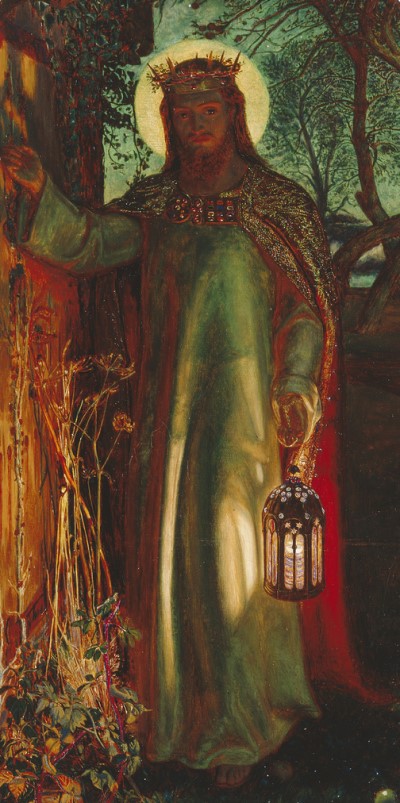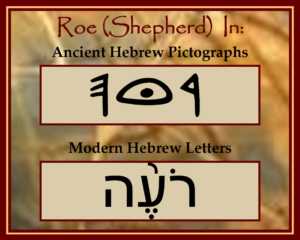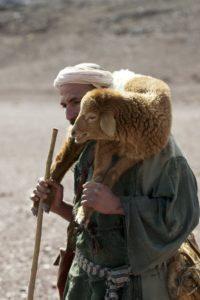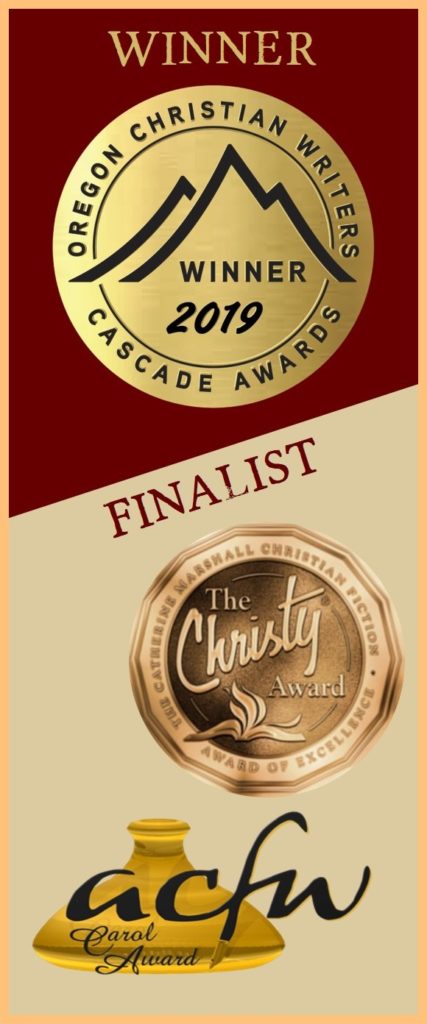The Life-Giving I AMs of Jesus: The Good Shepherd
Two Final Pearls of Revelation
“I AM the good shepherd; the good shepherd lays down His life for the sheep.” (John 10:11)

Lauren Crews
This is the fourth post in a series on The Life-Giving I AMs of Jesus. Once again, I have the privilege of sharing the mic with teacher extraordinaire, author and speaker Lauren Crews, a regular guest here at Five Stones and a Sling, to wrestle with these life-giving truths.
John’s gospel, of all the gospels, is strategically structured around seven miracles, seven discourses, and seven I AM statements. We’re diving into the seven I AM statements John has so carefully presented to us, and wringing out their deeper context in light of the culture of the day. The previous posts in the series are:
Our last post left us a few days after the Feast of Tabernacles, and after Yeshua dramatically healed the man born blind. Our Lord is having a discourse with the Pharisees–and tensions are mounting. As we discussed last time, when Yeshua declares Himself the good shepherd, He directly confronts the authority they’ve taken upon themselves, presenting themselves as the shepherds of Israel (Num 27:15-17).
We’ve been talking about how Yeshua strung together pearls of revelation, starting from the end of the Feast of Tabernacles. Lauren, what’s Yeshua’s next explosive “pearl” statement?
I AM the Good Shepherd Proclaims Him as Messiah
Lauren:
Yeshua adds the next pearl:
I am the good shepherd; and I know My own, and My own know me, even as the Father knows Me and I know the Father. (John 10:14,15).
In our western thinking, we often relate the shepherd reference to Psalms 23, “The Lord is my shepherd, I shall not want,” which is a great reference.
Linda:
Observant Jews have read that Psalm every Shabbat for millenia. That Psalm, with its beautiful images concerning God’s watchcare over His sheep, would have been as familiar to Yeshua’s audience as it is to us.
Lauren:
True. But we must also remember the atmosphere of His time. Israel was eagerly awaiting Messiah, and they were already wrestling with the idea that Jesus could be Messiah (John 6:14, 7:40-41). Messianic scriptures like this one were swirling through their minds.
Behold, the Lord God will come with might,
With His arm ruling for Him.
Behold, His reward is with Him
And His recompense before Him.
Like a shepherd He will tend His flock,
In His arm He will gather the lambs
And carry them in His bosom;
He will gently lead the nursing ewes. (Is 40:10-11)
Linda:
Absolutely. The good shepherd is one of scripture’s richest recurring themes. How about the Bridegroom / Shepherd / King who appears in the Song of Songs, knocking in vain at the door of His wayward bride? That figure strikes me as a type of Messiah–in fact this much-quoted verse would seem to reference that image.
Behold, I stand at the door and knock. If anyone hears my voice and opens the door, I will come in to him and dine with him, and He with me. (Rev 3:20)
Lauren:
Ezekiel 34 is another passage Yeshua’s words might well have brought to mind. And it’s a scathing condemnation of the Pharisees.
Thus says the Lord God, “Behold, I am against the shepherds, and I will demand My sheep from them and make them cease from feeding sheep. So the shepherds will not feed themselves anymore, but I will deliver My flock from their mouth, so that they will not be food for them.” (Ezek 34:10)
Then, in verses 15 and 16:
I will feed My flock and I will lead them to rest, declares the Lord God. I will seek the lost, bring back the scattered, bind up the broken and strengthen the sick; but the fat and the strong I will destroy. I will feed them with judgment. (Ez 34:15-16)
If by any chance this messianic reference was lost on His audience, Yeshua reinforced the message when He met Zacchaeus.
For the Son of Man came to seek and to save the lost. (Luke 19:9)
…a direct reference to Ezekiel 34:16, “I will search for the lost and bring back the strays.”
Linda:
If you read Ezekiel 34 in its entirety, the condemnation of the self-appointed shepherds of Israel, who failed to truly care for the flock, is stunning in its severity. By applying these words to the Pharisees, Yeshua could not have been more “in their face.” But as He also said of them,
For they bind heavy burdens, hard to bear, and lay them on men’s shoulders; but they themselves will not move them with one of their fingers. (Matt 23:4)
Their concern was all about maintaining the outward appearance of righteousness, without really surrendering their hearts.
There’s another clear theme that emerges from Ezekiel 34. It is God Himself who will take on the role of the good shepherd. Looking again at the verses quoted above:
I will feed My flock and I will lead them to rest, declares the Lord God. I will seek the lost, bring back the scattered, bind up the broken and strengthen the sick; but the fat and the strong I will destroy. I will feed them with judgment. (Ez 34:15-16)
So when Yeshua claimed to be the good shepherd, He was claiming more than His role as the destined leader. More than His role as Messiah.
Lauren:
Yes. These references confirm the divinity of Messiah and that God himself, in the body of the man Yeshua, will be the shepherd.
Linda:
I sometimes muse whether, if Yeshua had “only” claimed to be Messiah, perhaps they would have accepted Him. I mean, with all the signs He performed He made a pretty indisputable case for Himself! But I think the challenge then, as today, was for them to acknowledge His deity. It seems like it’s the deity of Messiah that every cult stumbles over!
Lauren:
Exactly. And now Yeshua takes it a bit further and adds the final, most valuable pearl.
I AM the Good Shepherd Prepares Him to Be the Sacrificial Lamb
For this reason, the Father loves Me, because I lay down My life and I may take it again. No one has taken it away from Me, but I lay it down on My own initiative…. This command I receive from My Father. (John 10:17-18).
Not only was God Himself the Good Shepherd, but He would also be the final sacrificial lamb. I’m hoping by now you are beginning to string your own pearls. Did the reminder of God Himself being the sacrifice bring to mind the story of Abraham sacrificing his only son? God Himself brought the sacrifice then too (Genesis 22:8).
For Yeshua’s audience, just after the eight-day Feast of Tabernacles, the daily recitation of the Hallel during the Feast would have left the words of Psalm 118 fresh on their minds.
Blessed is the one who comes in the name of the Lord…Bind the festival sacrifice with the cords to the horns of the altar. (Psalm 118:26-27)
The Good Shepherd not only lays down His life to protect His sheep, but He goes on to lay down His life as a sacrificial lamb. As John the Baptist proclaimed, “Behold, the lamb of God who takes away the sins of he world!”
With outstretched arms, Jesus will span the gap between the Temple’s Altar of Sacrifice and the cross. He received this command by the Father, He came in the name of the Lord and He would do it all under His own initiative. If that wasn’t the case, He would only be another meaningless martyr.
I can’t help but wonder if this passage also hints at a word play, another valuable pearl. Jesus rebuked the Pharisees’ blindness after healing a blind man. The passage ends with the crowd questioning if a demon could open the eyes of the blind. I imagine they are debating whether Jesus was sent by God, whether He was the divine Messiah or demon possessed.
Combining John 10:14 with Psalm 18:27 reveals the word play. Psalm 118:27 begins, “The Lord is God and He has given us light.” The blind man was given light, but how does the Good Shepherd fit? Shepherd in Hebrew is spelled reysh, ayin, hei. It is the word roe. The letter’s pictographs offer:
Reysh – Head, person
Ayin – Eye
Hei – What comes from
Roe means man of the eye. The eye sees and is often a symbol of understanding. Jesus as the Good Shepherd asserts that He knows those who are His and all spiritual understanding will come from Him as He lays down His life and claims His messianic kingship.
Linda:
Wow! That connection between Yeshua as the source of the blind man’s sight and as the Good Shepherd who truly sees the sheep is one I wouldn’t have caught!
I see one other connection here. The Feast of Tabernacles is all about celebrating God’s presence among His people.
The Lord Himself sheltered the Jews with Clouds of Glory and supernaturally provided for them during the forty years of wandering in the desert…. The purpose of the sukkah [booths] is to remind us of the type of huts the ancient Israelites dwelt in as they made their trek through the dangers of the desert…. The sukkah is meant to remind us of the Clouds of Glory that protected the Jewish people while they sojourned.
– John J. Parsons, Hebrew4Christians.com
By declaring Himself the Good Shepherd who walks with the sheep, Yeshua is telling His people in yet one more way that He is the reality behind the Feast. The “sheltering presence.”
And the Word became flesh and dwelt among us… (John 1:14)
The word for “dwelt” here is σκηνόω, skenoo, which is the verb form of σκηνος, skenos, a tent or tabernacle! The same word appears in Rev 21:3: “… the tabernacle of God is among men, and He will dwell (σκηνόω) among them…” So according to John 1:14, in Yeshua the word became flesh and “tabernacled” among us! (It’s even likely Yeshua was born during Sukkot.)
So… They had just finished an eight-day celebration featuring water rituals, light shows, and tabernacles. Yeshua concludes the festivities by announcing that He is
- The source of living water,
- The light of the world, and finally,
- God’s very presence tabernacle-ing among them.
For me, this brings new dimension to His statement:
Do not think that I came to destroy the Law or the Prophets. I did not come to destroy but to fulfill. For assuredly, I say to you, till heaven and earth pass away, one jot or one tittle will by no means pass from the law till all is fulfilled. (Matt 5:17-18)
Yeshua’s string of pearls was designed to show His hearers that the deeper meaning behind the Great Feast has been fulfilled, in the very person of our Lord!
If you’ve never opened God’s free gift of salvation through Jesus (Rom 3:23, 6:23), if you’ve never invited Him to become your shepherd, please please please be persuaded to do it now! It’s simple. Just tell God from your heart that you admit you’re a sinner that needs a Savior (“For all have sinned and fall short of the glory of God.” Rom 3:23) that you’re done running your own life, and that you’re ready to make Jesus Lord of your life.
If you confess with your mouth Jesus as Lord, and believe in your heart that God has raised Him from the dead, you shall be saved. For with the heart a person believes, resulting in righteousness, and with the mouth he confesses, resulting in salvation. For the Scripture says, “Whoever believes in Him will not be disappointed.” (Rom 10:9-11)
The decision that saves you is that simple!
Simple… But no one said living it out will be easy. Especially now.
Lauren Crews, MDiv.
As a Bible teacher and speaker, Lauren is excited to encourage Christians to explore and understand the Jewish roots of their faith. She lives in north-east Florida with her husband and two chocolate labs. She is mom of three fantastic young adults and recently welcomed a daughter-in-love to the Crews crew. She is represented by Credo Communications and working toward the publication of her books The Strength of a Woman and Jesus: The Alef and the Tav. You can connect with Lauren on the web at www.laurencrews.com.








No Comments